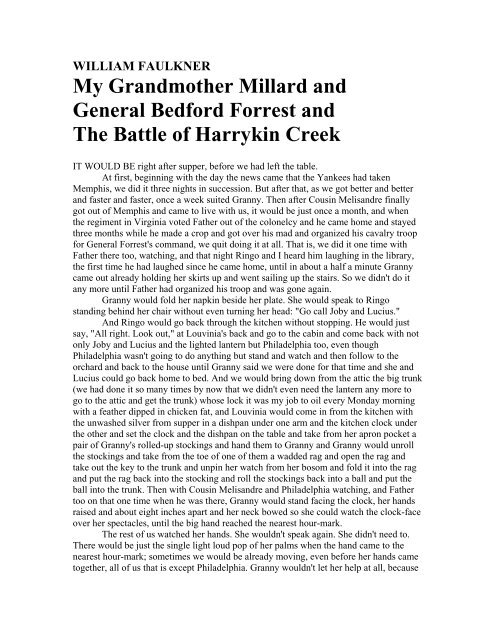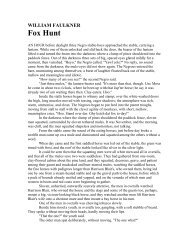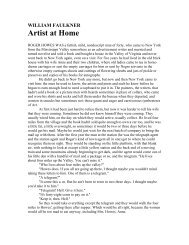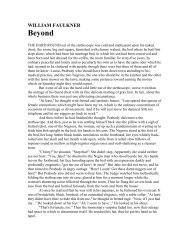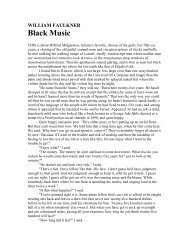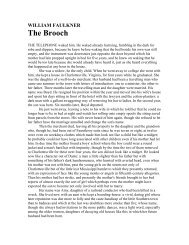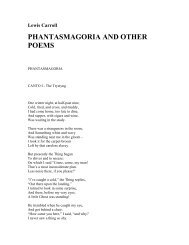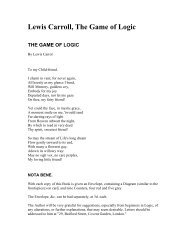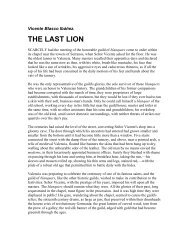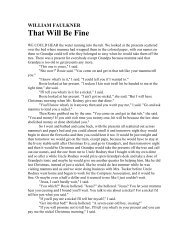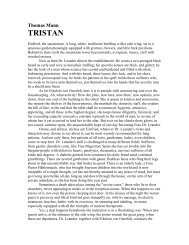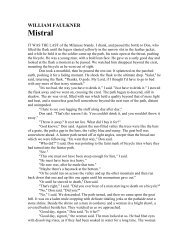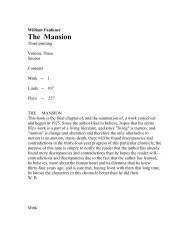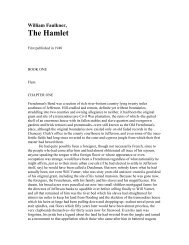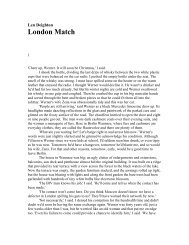WILLIAM FAULKNER My Grandmother Millard ... - literature save 2
WILLIAM FAULKNER My Grandmother Millard ... - literature save 2
WILLIAM FAULKNER My Grandmother Millard ... - literature save 2
Create successful ePaper yourself
Turn your PDF publications into a flip-book with our unique Google optimized e-Paper software.
<strong>WILLIAM</strong> <strong>FAULKNER</strong><strong>My</strong> <strong>Grandmother</strong> <strong>Millard</strong> andGeneral Bedford Forrest andThe Battle of Harrykin CreekIT WOULD BE right after supper, before we had left the table.At first, beginning with the day the news came that the Yankees had takenMemphis, we did it three nights in succession. But after that, as we got better and betterand faster and faster, once a week suited Granny. Then after Cousin Melisandre finallygot out of Memphis and came to live with us, it would be just once a month, and whenthe regiment in Virginia voted Father out of the colonelcy and he came home and stayedthree months while he made a crop and got over his mad and organized his cavalry troopfor General Forrest's command, we quit doing it at all. That is, we did it one time withFather there too, watching, and that night Ringo and I heard him laughing in the library,the first time he had laughed since he came home, until in about a half a minute Grannycame out already holding her skirts up and went sailing up the stairs. So we didn't do itany more until Father had organized his troop and was gone again.Granny would fold her napkin beside her plate. She would speak to Ringostanding behind her chair without even turning her head: "Go call Joby and Lucius."And Ringo would go back through the kitchen without stopping. He would justsay, "All right. Look out," at Louvinia's back and go to the cabin and come back with notonly Joby and Lucius and the lighted lantern but Philadelphia too, even thoughPhiladelphia wasn't going to do anything but stand and watch and then follow to theorchard and back to the house until Granny said we were done for that time and she andLucius could go back home to bed. And we would bring down from the attic the big trunk(we had done it so many times by now that we didn't even need the lantern any more togo to the attic and get the trunk) whose lock it was my job to oil every Monday morningwith a feather dipped in chicken fat, and Louvinia would come in from the kitchen withthe unwashed silver from supper in a dishpan under one arm and the kitchen clock underthe other and set the clock and the dishpan on the table and take from her apron pocket apair of Granny's rolled-up stockings and hand them to Granny and Granny would unrollthe stockings and take from the toe of one of them a wadded rag and open the rag andtake out the key to the trunk and unpin her watch from her bosom and fold it into the ragand put the rag back into the stocking and roll the stockings back into a ball and put theball into the trunk. Then with Cousin Melisandre and Philadelphia watching, and Fathertoo on that one time when he was there, Granny would stand facing the clock, her handsraised and about eight inches apart and her neck bowed so she could watch the clock-faceover her spectacles, until the big hand reached the nearest hour-mark.The rest of us watched her hands. She wouldn't speak again. She didn't need to.There would be just the single light loud pop of her palms when the hand came to thenearest hour-mark; sometimes we would be already moving, even before her hands cametogether, all of us that is except Philadelphia. Granny wouldn't let her help at all, because
of Lucius, even though Lucius had done nearly all the digging of the pit and did most ofthe carrying of the trunk each time.But Philadelphia had to be there. Granny didn't have to tell her but once. "I wantthe wives of all the free men here too," Granny said. "I want all of you free folks to watchwhat the rest of us that ain't free have to do to keep that way."That began about eight months ago. One day even I realized that something hadhappened to Lucius. Then I knew that Ringo had already seen it and that he knew what itwas, so that when at last Louvinia came and told Granny, it was not as if Lucius haddared his mother to tell her but as if he had actually forced somebody, he didn't care who,to tell her. He had said it more than once, in the cabin one night probably for the firsttime, then after that in other places and to other people, to Negroes from other plantationseven. Memphis was already gone then, and New Orleans, and all we had left of the Riverwas Vicksburg and although we didn't believe it then, we wouldn't have that long. Thenone morning Louvinia came in where Granny was cutting down the worn-out uniformpants Father had worn home from Virginia so they would fit me, and told Granny howLucius was saying that soon the Yankees would have all of Mississippi andYoknapatawpha County too and all the niggers would be free and that when thathappened, he was going to be long gone. Lucius was working in the garden that morning.Granny went out to the back gallery, still carrying the pants and the needle. She didn'teven push her spectacles up. She said, "You, Lucius," just once, and Lucius came out ofthe garden with the hoe and Granny stood looking down at him over the spectacles as shelooked over them at everything she did, from reading or sewing to watching the clockfaceuntil the instant came to start burying the silver."You can go now," she said. "You needn't wait on the Yankees.""Go?" Lucius said. "I ain't free.""You've been free for almost three minutes," Granny said. "Go on."Lucius blinked his eyes while you could have counted about ten. "Go where?" hesaid."I can't tell you," Granny said. "I ain't free. I would imagine you will have allYankeedom to move around in."Lucius blinked his eyes. He didn't look at Granny now."Was that all you wanted?" he said."Yes," Granny said. So he went back to the garden. And that was the last weheard about being free from him. That is, it quit showing in the way he acted, and if hetalked any more of it, even Louvinia never thought it was worth bothering Granny with.It was Granny who would do the reminding of it, especially to Philadelphia, especially onthe nights when we would stand like race-horses at the barrier, watching Granny's handsuntil they clapped together.Each one of us knew exactly what he was to do. I would go upstairs for Granny'sgold hatpin and her silver-headed umbrella and her plumed Sunday hat because she hadalready sent her ear-rings and brooch to Richmond a long time ago, and to Father's roomfor his silver-backed brushes and to Cousin Melisandre's room after she came to live withus for her things because the one time Granny let Cousin Melisandre try to help too,Cousin Melisandre brought all her dresses down. Ringo would go to the parlor for thecandlesticks and Granny's dulcimer and the medallion of Father's mother back inCarolina. And we would run back to the dining-room where Louvinia and Lucius would
have the sideboard almost cleared, and Granny still standing there and watching theclock-face and the trunk both now with her hands ready to pop again and they would popand Ringo and I would stop at the cellar door just long enough to snatch up the shovelsand run on to the orchard and snatch the brush and grass and the criss-crossed sticks awayand have the pit open and ready by the time we saw them coming: first Louvinia with thelantern, then Joby and Lucius with the trunk and Granny walking beside it and CousinMelisandre and Philadelphia (and on that one time Father, walking along and laughing)following behind. And on that first night, the kitchen clock wasn't in the trunk. Grannywas carrying it, while Louvinia held the lantern so that Granny could watch the hand,Granny made us put the trunk into the pit and shovel the dirt back and smooth it off andlay the brush and grass back over it again and then dig up the trunk and carry it back tothe house. And one night, it seemed like we had been bringing the trunk down from theattic and putting the silver into it and carrying it out to the pit and uncovering the pit andthen covering the pit again and turning around and carrying the trunk back to the houseand taking the silver out and putting it back where we got it from all winter and allsummer too; that night, and I don't know who thought of it first, maybe it was all of us atonce. But anyway the clock-hand had passed four hour-marks before Granny's handseven popped for Ringo and me to run and open the pit. And they came with the trunk andRingo and I hadn't even put down the last armful of brush and sticks, to <strong>save</strong> having tostoop to pick it up again, and Lucius hadn't even put down his end of the trunk for thesame reason and I reckon Louvinia was the only one that knew what was coming nextbecause Ringo and I didn't know that the kitchen clock was still sitting on the diningroomtable. Then Granny spoke. It was the first time we had ever heard her speakbetween when she would tell Ringo, "Go call Joby and Lucius," and then tell us bothabout thirty minutes later: "Wash your feet and go to bed." It was not loud and not long,just two words: "Bury it." And we lowered the trunk into the pit and Joby and Luciusthrew the dirt back in and even then Ringo and I didn't move with the brush until Grannyspoke again, not loud this time either: "Go on. Hide the pit." And we put the brush backand Granny said, "Dig it up." And we dug up the trunk and carried it back into the houseand put the things back where we got them from and that was when I saw the kitchenclock still sitting on the dining-room table.And we all stood there watching Granny's hands until they popped together andthat time we filled the trunk and carried it out to the orchard and lowered it into the pitquicker than we had ever done before.IIAND THEN when the time came to really bury the silver, it was too late. After it was allover and Cousin Melisandre and Cousin Philip were finally married and Father had gotdone laughing, Father said that always happened when a heterogeneous collection ofpeople who were cohered simply by an uncomplex will for freedom engaged with atyrannous machine. He said they would always lose the first battles, and if they wereoutnumbered and outweighed enough, it would seem to an outsider that they were goingto lose them all. But they would not. They could not be defeated; if they just willed thatfreedom strongly and completely enough to sacrifice all else for it: ease and comfort and
fatness of spirit and all, until whatever it was they had left would be enough, no matterhow little it was that very freedom itself would finally conquer the machine as a negativeforce like drouth or flood could strangle it. And later still, after two more years and weknew we were going to lose the war, he was still saying that. He said, "I won't see it, butyou will. You will see it in the next war, and in all the wars Americans will have to fightfrom then on. There will be men from the South in the forefront of all the battles, evenleading some of them, helping those who conquered us defend that same freedom whichthey believed they had taken from us." And that happened: thirty years later, and GeneralWheeler, whom Father would have called apostate, commanding in Cuba, and whom oldGeneral Early did call apostate and matricide too in the office of the Richmond editorwhen he said: "I would like to have lived so that when my time comes, I will see RobertLee again. But since I haven't, I'm certainly going to enjoy watching the devil burn thatblue coat off Joe Wheeler."We didn't have time. We didn't even know there were any Yankees in Jefferson,let alone within a mile of Sartoris.There never had been many. There was no railroad then and no river big enoughfor big boats and nothing in Jefferson they would have wanted even if they had come,since this was before Father had had time to worry them enough for General Grant toissue a general order with a reward for his capture. So we had got used to the war. Wethought of it as being definitely fixed and established as a railroad or a river is, movingeast along the railroad from Memphis and south along the River toward Vicksburg. Wehad heard tales of Yankee pillage and most of the people around Jefferson stayed ready tobury their silver fast too, though I don't reckon any of them practiced doing it like we did.But nobody we knew was even kin to anyone who had been pillaged, and so I don't thinkthat even Lucius really expected any Yankees until that morning.It was about eleven o'clock. The table was already set for dinner and everybodywas beginning to kind of ease up so we would be sure to hear when Louvinia went out tothe back gallery and rang the bell, when Ab Snopes came in at a dead run, on a strangehorse as usual. He was a member of Father's troop. Not a fighting member; he calledhimself father's horse-captain, whatever he meant by it, though we had a pretty good idea,and none of us at least knew what he was doing in Jefferson when the troop wassupposed to be up in Tennessee with General Bragg, and probably nobody anywhereknew the actual truth about how he got the horse, galloping across the yard and rightthrough one of Granny's flower beds because I reckon he figured that carrying a messagehe could risk it, and on around to the back because he knew that, message or no message,he better not come to Granny's front door hollering that way, sitting that strange blownhorse with a U. S. army brand on it you could read three hundred yards and yelling up atGranny that General Forrest was in Jefferson but there was a whole regiment of Yankeecavalry not a half a mile down the road.So we never had time. Afterward Father admitted that Granny's error was not instrategy nor tactics either, even though she had copied from someone else. Because hesaid it had been a long time now since originality had been a component of militarysuccess. It just happened too fast. I went for Joby and Lucius and Philadelphia becauseGranny had already sent Ringo down to the road with a cup towel to wave when theycame in sight. Then she sent me to the front window where I could watch Ringo. WhenAb Snopes came back from hiding his new Yankee horse, he offered to go upstairs to get
the things there. Granny had told us a long time ago never to let Ab Snopes go anywhereabout the house unless somebody was with him. She said she would rather have Yankeesin the house any day because at least Yankees would have more delicacy, even if it wasn'tanything but good sense, than to steal a spoon or candlestick and then try to sell it to oneof her own neighbors, as Ab Snopes would probably do. She didn't even answer him. Shejust said, "Stand over there by that door and be quiet." So Cousin Melisandre wentupstairs after all and Granny and Philadelphia went to the parlor for the candlesticks andthe medallion and the dulcimer, Philadelphia not only helping this time, free or not, butGranny wasn't even using the clock.It just all happened at once. One second Ringo was sitting on the gate-post,looking up the road. The next second he was standing on it and waving the cup towel andthen I was running and hollering, back to the dining-room, and I remember the whites ofJoby's and Lucius's and Philadelphia's eyes and I remembered Cousin Melisandre's eyeswhere she leaned against the sideboard with the back of her hand against her mouth, andGranny and Louvinia and Ab Snopes glaring at one another across the trunk and I couldhear Louvinia's voice even louder than mine: "Miz Cawmpson! Miz Cawmpson!""What?" Granny cried. "What? Mrs. Compson?" Then we all remembered. It waswhen the first Yankee scouting patrol entered Jefferson over a year ago. The war wasnew then and I suppose General Compson was the only Jefferson soldier they had heardof yet. Anyway, the officer asked someone in the Square where General Compson livedand old Doctor Holston sent his Negro boy by back alleys and across lots to warn Mrs.Compson in time, and the story was how the Yankee officer sent some of his menthrough the empty house and himself rode around to the back where old Aunt Roxannewas standing in front of the outhouse behind the closed door of which Mrs. Compson wassitting, fully dressed even to her hat and parasol, on the wicker hamper containing herplate and silver. "Miss in dar," Roxanne said. "Stop where you is." And the story toldhow the Yankee officer said, "Excuse me," and raised his hat and even backed the horse afew steps before he turned and called his men and rode away."The privy!" Granny cried."Hell fire, Miz <strong>Millard</strong>!" Ab Snopes said. And Granny never said anything. Itwasn't like she didn't hear, because she was looking right at him. It was like she didn'tcare; that she might have even said it herself. And that shows how things were then: wejust never had time for anything. "Hell fire," Ab Snopes said, "all north Missippi has doneheard about that! There ain't a white lady between here and Memphis that ain't setting inthe back house on a grip full of silver right this minute.""Then we're already late," Granny said. "Hurry.""Wait!" Ab Snopes said. "Wait! Even them Yankees have done caught onto thatby now!""Then let's hope these are different Yankees," Granny said. "Hurry.""But Miz <strong>Millard</strong>!" Ab Snopes cried. "Wait! Wait!"But then we could hear Ringo yelling down at the gate and I remember Joby andLucius and Philadelphia and Louvinia and the balloon-like swaying of CousinMelisandre's skirts as they ran across the back yard, the trunk somewhere among them; Iremember how Joby and Lucius tumbled the trunk into the little tall narrow flimsy sentryboxand Louvinia thrust Cousin Melisandre in and slammed the door and we could hearRingo yelling good now, almost to the house, and then I was back at the front window
and I saw them just as they swept around the house in a kind of straggling-clump six menin blue, riding fast yet with something curious in the action of the horses, as if they werenot only yoked together in spans but were hitched to a single wagon-tongue, then Ringoon foot running and not yelling now, and last of all the seventh rider, bareheaded andstanding in his stirrups and with a sabre over his head. Then I was on the back galleryagain, standing beside Granny above that moil of horses and men in the yard, and she waswrong. It was as if these were not only the same ones who had been at Mrs. Compson'slast year, but somebody had even told them exactly where our outhouse was. The horseswere yoked in pairs, but it was not a wagon-tongue, it was a pole, almost a log, twentyfeet long, slung from saddle to saddle between the three span; and I remember the faces,unshaven and wan and not so much peering as frantically gleeful, glaring up at us for aninstant before the men leaped down and unslung the pole and jerked the horses aside andpicked up the pole, three to a side, and began to run across the yard with it as the lastrider came around the house, in gray (an officer: it was Cousin Philip, though of coursewe didn't know that then, and there was going to be a considerable more uproar andconfusion before he finally became Cousin Philip and of course we didn't know thateither), the sabre still lifted and not only standing in the stirrups but almost lying downalong the horse's neck. The six Yankees never saw him. And we used to watch Fatherdrilling his troop in the pasture, changing them from column to troop front at full gallop,and you could hear his voice even above the sound of the galloping hooves but it wasn't abit louder than Granny's. "There's a lady in there!" she said. But the Yankees never heardher any more than they had seen Cousin Philip yet, the whole mass of them, the six menrunning with the pole and Cousin Philip on the horse, leaning out above them with alifted sabre, rushing on across the yard until the end of the pole struck the outhouse door.It didn't just overturn, it exploded. One second it stood there, tall and narrow and flimsy;the next second it was gone and there was a boil of yelling men in blue coats darting anddodging around under Cousin Philip's horse and the flashing sabre until they could find achance to turn and run. Then there was a scatter of planks and shingles and CousinMelisandre sitting beside the trunk in the middle of it, in the spread of her hoops, her eyesshut and her mouth open, still screaming, and after a while a feeble popping of pistolshotsfrom down along the creek that didn't sound any more like war than a boy withfirecrackers."I tried to tell you to wait!" Ab Snopes said behind us, "I tried to tell you themYankees had done caught on!"After Joby and Lucius and Ringo and I finished burying the trunk in the pit andhiding the shovel-marks, I found Cousin Philip in the summer house. His sabre and beltwere propped against the wall but I don't reckon even he knew what had become of hishat. He had his coat off too and was wiping it with his handkerchief and watching thehouse with one eye around the edge of the door. When I came in he straightened up and Ithought at first he was looking at me.Then I don't know what he was looking at. "That beautiful girl," he said. "Fetchme a comb.""They're waiting for you in the house," I said. "Granny wants to know what's thematter." Cousin Melisandre was all right now. It took Louvinia and Philadelphia both andfinally Granny to get her into the house but Louvinia brought the elder-flower wine
efore Granny had time to send her after it and now Cousin Melisandre and Granny werewaiting in the parlor."Your sister," Cousin Philip said. "And a hand-mirror.""No, Sir," I said. "She's just our cousin. From Memphis."Granny says " Because he didn't know Granny. It was pretty good for her to waitany time for anybody. But he didn't even let me finish.""That beautiful, tender girl," he said. "And send a nigger with a basin of water anda towel." I went back toward the house. This time when I looked back I couldn't see hiseye around the door-edge. "And a clothes brush," he said.Granny wasn't waiting very much. She was at the front door. "Now what?" shesaid. I told her. "Does the man think we are giving a ball here in the middle of the day?Tell him I said to come on in and wash on the back gallery like we do. Louvinia's puttingdinner on, and we're already late." But Granny didn't know Cousin Philip either. I told heragain.She looked at me. "What did he say?" she said."He didn't say anything," I said. "Just that beautiful girl.""That's all he said to me too," Ringo said. I hadn't heard him come in. "'Sides thesoap and water. Just that beautiful girl.""Was he looking at you either when he said it?" I said."No," Ringo said. "I just thought for a minute he was."Now Granny looked at Ringo and me both. "Hah," she said, and afterward when Iwas older I found out that Granny already knew Cousin Philip too, that she could look atone of them and know all the other Cousin Melisandres and Cousin Philips both withouthaving to see them. "I sometimes think that bullets are just about the least fatal things thatfly, especially in war. All right," she said. "Take him his soap and water. But hurry."We did. This time he didn't say "that beautiful girl." He said it twice. He took offhis coat and handed it to Ringo."Brush it good," he said. "Your sister, I heard you say.""No, you didn't," I said."No matter," he said. "I want a nosegay. To carry in my hand.""Those flowers are Granny's," I said."No matter," he said. He rolled up his sleeves and began to wash. "A small one.About a dozen blooms. Get something pink."I went and got the flowers. I don't know whether Granny was still at the front dooror not. Maybe she wasn't. At least she never said anything. So I picked the ones AbSnope's new Yankee horse had already trampled down and wiped the dirt off of them andstraightened them out and went back to the summer house where Ringo was holding thehand-glass while Cousin Philip combed his hair. Then he put on his coat and buckled onhis sabre again and held his feet out one at a time for Ringo to wipe his boots off with thetowel, and Ringo saw it. I wouldn't have spoken at all because we were already later fordinner than ever now, even if there hadn't never been a Yankee on the place. "You toreyour britches on them Yankees," Ringo said.So I went back to the house. Granny was standing in the hall. This time she justsaid, "Yes?" It was almost quiet."He tore his britches," I said. And she knew more about Cousin Philip than evenRingo could find out by looking at him. She had the needle already threaded in the bosom
of her dress. And I went back to the summer house and then we came back to the houseand up to the front door and I waited for him to go into the hall but he didn't, he just stoodthere holding the nosegay in one hand and his hat in the other, not very old, looking atthat moment anyway not very much older than Ringo and me for all his braid and sashand sabre and boots and spurs, and even after just two years looking like all our soldiersand most of the other people too did: as if it had been so long now since he had had all hewanted to eat at one time that even his memory and palate had forgotten it and only hisbody remembered, standing there with his nosegay and that beautiful-girl look in his facelike he couldn't have seen anything even if he had been looking at it."No," he said. "Announce me. It should be your nigger. But no matter." He saidhis full name, all three of them, twice, as if he thought I might forget them before I couldreach the parlor."Go on in," I said. "They're waiting for you. They had already been waiting foryou even before you found your pants were torn.""Announce me," he said. He said his name again. "Of Tennessee. Lieutenant,Savage's Battalion, Forrest's Command, Provisional Army, Department of the West."So I did. We crossed the hall to the parlor, where Granny stood between CousinMelisandre's chair and the table where the decanter of elder-flower wine and three freshglasses and even a plate of the tea cakes Louvinia had learned to make from cornmealand molasses were sitting, and he stopped again at that door too and I know he couldn'teven see Cousin Melisandre for a minute, even though he never had looked at anythingelse but her. "Lieutenant Philip St-Just Backhouse," I said. I said it loud, because he hadrepeated it to me three times so I would be sure to get it right and I wanted to say it to suithim too since even if he had made us a good hour late for dinner, at least he had <strong>save</strong>d thesilver. "Of Tennessee," I said. "Savage's Battalion, Forrest's Command, ProvisionalArmy, Department of the West."While you could count maybe five, there wasn't anything at all. Then CousinMelisandre screamed. She sat bolt upright on the chair like she had sat beside the trunk inthe litter of planks and shingles in the back yard this morning, with her eyes shut and hermouth open again, screaming.IllSO WE were still another half an hour late for dinner. Though this time it never neededanybody but Cousin Philip to get Cousin Melisandre upstairs. All he needed to do was totry to speak to her again. Then Granny came back down and said, "Well, if we don't wantto just quit and start calling it supper, we'd better walk in and eat it within the next hourand a half at least." So we walked in. Ab Snopes was already waiting in the dining-room.I reckon he had been waiting longer than anybody, because after all Cousin Melisandrewasn't any kin to him. Ringo drew Granny's chair and we sat down. Some of it was cold.The rest of it had been on the stove so long now that when you ate it it didn't matterwhether it was cold or not. But Cousin Philip didn't seem to mind. And maybe it didn'ttake his memory very long to remember again what it was like to have all he wanted toeat, but I don't think his palate ever tasted any of it. He would sit there eating like hehadn't seen any food of any kind in at least a week, and like he was expecting what was
even already on his fork to vanish before he could get it into his mouth. Then he wouldstop with the fork halfway to his mouth and sit there looking at Cousin Melisandre'sempty place, laughing. That is, I don't know what else to call it but laughing. Until at lastI said, "Why don't you change your name?"Then Granny quit eating too. She looked at me over her spectacles. Then she tookboth hands and lifted the spectacles up her nose until she could look at me through them.Then she even pushed the spectacles up into her front hair and looked at me. "That's thefirst sensible thing I've heard said on this place since eleven o'clock this morning," shesaid."It's so sensible and simple that I reckon only a child could have thought of it."She looked at him. "Why don't you?" He laughed some more. That is, his face did thesame way and he made the same sound again. "<strong>My</strong> grandfather was at King's Mountain,with Marion all through Carolina. <strong>My</strong> uncle was defeated for Governor of Tennessee by acorrupt and traitorous cabal of tavern-keepers and Republican Abolitionists, and myfather died at Chapultepec. After that, the name they bore is not mine to change. Even mylife is not mine so long as my country lies bleeding and ravished beneath an invader'siron heel." Then he stopped laughing, or whatever it was. Then his face looked surprised.Then it quit looking surprised, the surprise fading out of it steady at first and graduallyfaster but not very much faster like the heat fades out of a piece of iron on a blacksmith'sanvil until his face just looked amazed and quiet and almost peaceful. "Unless I lose it inbattle," he said."You can't very well do that sitting here," Granny said."No," he said. But I don't think he even heard her except with his ears. He stoodup. Even Ab Snopes was watching him now, his knife stopped halfway to his mouth witha wad of greens on the end of the blade. "Yes," Cousin Philip said.His face even had the beautiful-girl look on it again. "Yes," he said. He thankedGranny for his dinner. That is, I reckon that's what he had told his mouth to say. It didn'tmake much sense to us, but I don't think he was paying any attention to it at all. Hebowed. He wasn't looking at Granny nor at anything else. He said "Yes," again. Then hewent out. Ringo and I followed to the front door and watched him mount his horse and sitthere for a minute, bare-headed, looking up at the upstairs windows. It was Granny'sroom he was looking at, with mine and Ringo's room next to it. But Cousin Melisandrecouldn't have seen him even if she had been in either one of them, since she was in bedon the other side of the house with Philadelphia probably still wringing the cloths out incold water to lay on her head. He sat the horse well. He rode it well too: light and easyand back in the saddle and toes in and perpendicular from ankle to knee as Father hadtaught me. It was a good horse too."It's a damn good horse," I said."Git the soap," Ringo said.But even then I looked quick back down the hall, even if I could hear Grannytalking to Ab Snopes in the diningroom. "She's still in there," I said."Hah," Ringo said. "I done tasted soap in my mouth for a cuss I thought was aheap further off than that."Then Cousin Philip spurred the horse and was gone. Or so Ringo and I thouglit.Two hours ago none of us had ever even heard of him; Cousin Melisandre had seen himtwice and sat with her eyes shut screaming both times. But after we were older, Ringo
and I realized that Cousin Philip was probably the only one in the whole lot of us thatreally believed even for one moment that he had said goodbye forever, that not onlyGranny and Louvinia knew better but Cousin Melisandre did too, no matter what his lastname had the bad luck to be.We went back to the dining-room. Then I realized that Ab Snopes had beenwaiting for us to come back. Then we both knew he was going to ask Granny somethingbecause nobody wanted to be alone when they had to ask Granny something even whenthey didn't know they were going to have trouble with it. We had known Ab for over ayear now. I should have known what it was like. Granny already did. He stood up. "Well,Miz <strong>Millard</strong>," he said. "I figger you'll be safe all right from now on, with Bed Forrest andhis boys right there in Jefferson. But until things quiet down a mite more, I'll just leavethe horses in your lot for a day or two.""What horses?" Granny said. She and Ab didn't just look at one another. Theywatched one another."Them fresh-captured horses from this morning," Ab said."What horses?" Granny said. Then Ab said it."<strong>My</strong> horses." Ab watched her."Why?" Granny said. But Ab knew what she meant."I'm the only grown man here," he said. Then he said, "I seen them first. Theywere chasing me before..." Then he said, talking fast now; his eyes had gone kind ofglazed for a second but now they were bright again, looking in the stubbly dirt-coloredfuzz on his face like two chips of broken plate in a worn-out door-mat: "Spoils of war! Ibrought them here! I tolled them in here: a military and-bush! And as the only andranking Confedrit military soldier present...""You ain't a soldier," Granny said. "You stipulated that to Colonel Sartorisyourself while I was listening. You told him yourself you would be his independenthorse-captain but nothing more.""Ain't that just exactly what I am trying to be?" he said."Didn't I bring all six of them horses in here in my own possession, the same as ifI was leading them on a rope?""Hah," Granny said. "A spoil of war or any other kind of spoil don't belong to aman or a woman either until they can take it home and put it down and turn their back onit. You never had time to get home with even the one you were riding. You ran in the firstopen gate you came to, no matter whose gate it was.""Except it was the wrong one," he said. His eyes quit looking like china. Theydidn't look like anything. But I reckon his face would still look like an old door-mat evenafter he had turned all the way white. "So I reckon I got to even walk back to town," hesaid. "The woman that would..." His voice stopped. He and Granny looked at oneanother."Don't you say it," Granny said."Nome," he said. He didn't say it. "... a man of seven horses ain't likely to lendhim a mule.""No," Granny said. "But you won't have to walk."We all went out to the lot. I don't reckon that even Ab knew until then thatGranny had already found where he thought he had hidden the first horse and had itbrought up to the lot with the other six. But at least he already had his saddle and bridle
with him. But it was too late. Six of the horses moved about loose in the lot. The seventhone was tied just inside the gate with a piece of plow-line. It wasn't the horse Ab hadcome on because that horse had a blaze. Ab had known Granny long enough too. Heshould have known.Maybe he did. But at least he tried. He opened the gate."Well," he said, "it ain't getting no earlier. I reckon I better...""Wait," Granny said. Then we looked at the horse which was tied to the fence. Atfirst glance it looked the best one of the seven. You had to see it just right to tell its nearleg was sprung a little, maybe from being worked too hard too young under too muchweight. "Take that one," Granny said."That ain't mine," Ab said. "That's one of yourn. I'll just...""Take that one," Granny said. Ab looked at her. You could have counted at leastten."Hell fire, Miz <strong>Millard</strong>," he said."I've told you before about cursing on this place," Granny said."Yessum," Ab said. Then he said it again: "Hell fire." He went into the lot andrammed the bit into the tied horse's mouth and clapped the saddle on and snatched thepiece of plow-line off and threw it over the fence and got up and Granny stood there untilhe had ridden out of the lot and Ringo closed the gate and that was the first time I noticedthe chain and padlock from the smokehouse door and Ringo locked it and handed Grannythe key and Ab sat for a minute, looking down at her. "Well, good-day," he said. "I justhope for the sake of the Confedricy that Bed Forrest don't never tangle with you with allthe horses he's got." Then he said it again, maybe worse this time because now he wasalready on a horse pointed toward the gate: "Or you'll damn shore leave him just onemore passel of infantry before he can spit twice."Then he was gone too. Except for hearing Cousin Melisandre now and then, andthose six horses with U. S. branded on their hips standing in the lot, it might never havehappened. At least Ringo and I thought that was all of it. Every now and thenPhiladelphia would come downstairs with the pitcher and draw some more cold water forCousin Melisandre's cloths but we thought that after a while even that would just wearout and quit. Then Philadelphia came down again and came in to where Granny wascutting down a pair of Yankee pants that Father had worn home last time so they wouldfit Ringo. She didn't say anything. She just stood in the door until Granny said. "All right.What now?""She want the banjo," Philadelphia said."What?" Granny said. "<strong>My</strong> dulcimer? She can't play it. Go back upstairs."But Philadelphia didn't move. "Could I ax Mammy to come help me?""No," Granny said. "Louvinia's resting. She's had about as much of this as I wanther to stand. Go back upstairs. Give her some more wine if you can't think of anythingelse." And she told Ringo and me to go somewhere else, anywhere else, but even in theyard you could still hear Cousin Melisandre talking to Philadelphia. And once we evenheard Granny though it was still mostly Cousin Melisandre telling Granny that she hadalready forgiven her, that nothing whatever had happened and that all she wanted nowwas peace. And after a while Louvinia came up from the cabin without even being sentfor and went upstairs and then it began to look like we were going to be late for suppertoo. But Philadelphia finally came down and cooked it and carried Cousin Melisandre's
tray up and then we quit eating; we could hear Louvinia overhead, in Granny's room now,and she came down and set the untasted tray on the table and stood beside Granny's chairwith the key to the trunk in her hand."All right," Granny said. "Go call Joby and Lucius." We got the lantern and theshovels. We went to the orchard and removed the brush and dug up the trunk and got thedulcimer and buried the trunk and put the brush back and brought the key in to Granny.And Ringo and I could hear her from our room and Granny was right. We heard her for along time and Granny was surely right; she just never said but half of it. The moon cameup after a while and we could look down from our window into the garden, at CousinMelisandre sitting on the bench with the moonlight glinting on the pearl inlay of thedulcimer, and Philadelphia squatting on the sill of the gate with her apron over her head.Maybe she was asleep. It was already late. But I don't see how.So we didn't hear Granny until she was already in the room, her shawl over hernightgown and carrying a candle."In a minute I'm going to have about all of this I aim to stand too," she said. "Gowake Lucius and tell him to saddle the mule," she told Ringo. "Bring me the pen and inkand a sheet of paper." I fetched them. She didn't sit down. She stood at the bureau while Iheld the candle, writing even and steady and not very much, and signed her name and letthe paper lie open to dry until Lucius came in. "Ab Snopes said that Mr. Forrest is inJefferson," she told Lucius. "Find him. Tell him I will expect him here for breakfast inthe morning and to bring that boy." She used to know General Forrest in Memphis beforehe got to be a general. He used to trade with Grandfather <strong>Millard</strong>'s supply house andsometimes he would come out to sit with Grandfather on the front gallery and sometimeshe would eat with them. "You can tell him I have six captured horses for him," she said."And never mind patter-rollers or soldiers either. Haven't you got my signature on thatpaper?""I ain't worrying about them," Lucius said. "But suppose them Yankees...""I see," Granny said. "Hah. I forgot. You've been waiting for Yankees, haven'tyou? But those this morning seemed to be too busy trying to stay free to have much timeto talk about it, didn't they? Get along," she said. "Do you think any Yankee is going todare ignore what a Southern soldier or even a patter-roller wouldn't? And you go to bed,"she said.We lay down, both of us on Ringo's pallet. We heard the mule when Lucius left.Then we heard the mule and at first we didn't know we had been asleep, the mule comingback now and the moon had started down the west and Cousin Melisandre andPhiladelphia were gone from the garden, to where Philadelphia at least could sleep betterthan sitting on a square sill with an apron over her head, or at least where it was quieter.And we heard Lucius fumbling up the stairs but we never heard Granny at all because shewas already at the top of the stairs, talking down at the noise Lucius was trying not tomake. "Speak up," she said. "I ain't asleep but I ain't a lip-reader either. Not in the dark.""Genl Fawhrest say he respectful compliments," Lucius said, "and he can't cometo breakfast this morning because he gonter to be whuppin Genl Smith at TallahatchieCrossing about that time. But providin he ain't too fur away in the wrong direction whenhim and Genl Smith git done, he be proud to accept your invitation next time he in theneighborhood. And he say 'whut boy'."
While you could count about five, Granny didn't say anything. Then she said,"What?""He say 'whut boy'," Lucius said.Then you could have counted ten. All we could hear was Lucius breathing. ThenGranny said: "Did you wipe the mule down?""Yessum," Lucius said."Did you turn her back into the pasture?""Yessum," Lucius said."Then go to bed," Granny said. "And you too," she said.General Forrest found out what boy. This time we didn't know we had been asleepeither, and it was no one mule now.The sun was just rising. When we heard Granny and scrambled to the window,yesterday wasn't a patch on it. There were at least fifty of them now, in gray; the wholeoutdoors was full of men on horses, with Cousin Philip out in front of them, sitting hishorse in almost exactly the same spot where he had been yesterday, looking up atGranny's window and not seeing it or anything else this time either. He had a hat now. Hewas holding it clamped over his heart and he hadn't shaved and yesterday he had lookedyounger than Ringo because Ringo always had looked about ten years older than me. Butnow, with the first sun-ray making a little soft fuzz in the gold-colored stubble on hisface, he looked even younger than I did, and gaunt and worn in the face like he hadn'tslept any last night and something else in his face too: like he not only hadn't slept lastnight but by godfrey he wasn't going to sleep tonight either as long as he had anything todo with it. "Goodbye," he said. "Goodbye," and whirled his horse, spurring, and raisedthe new hat over his head like he had carried the sabre yesterday and the whole mass ofthem went piling back across flower beds and lawns and all and back down the drivetoward the gate while Granny still stood at her window in her nightgown, her voicelouder than any man's anywhere, I don't care who he is or what he would be doing:"Backhouse! Backhouse! You, Backhouse!"So we ate breakfast early. Granny sent Ringo in his nightshirt to wake Louviniaand Lucius both. So Lucius had the mule saddled before Louvinia even got the fire lit.This time Granny didn't write a note. "Go to Tallahatchie Crossing," she told Lucius. "Sitthere and wait for him if necessary.""Suppose they done already started the battle?" Lucius said."Suppose they have?" Granny said. "What business is that of yours or mineeither? You find Bedford Forrest. Tell him this is important; it won't take long. But don'tyou show your face here again without him."Lucius rode away. He was gone four days. He didn't even get back in time for thewedding, coming back up the drive about sundown on the fourth day with two soldiers inone of General Forrest's forage wagons with the mule tied to the tailgate. He didn't knowwhere he had been and he never did catch up with the battle. "I never even heard it," hetold Joby and Lucius and Louvinia and Philadelphia and Ringo and me. "If wars alwaysmoves that far and that fast, I don't see how they ever have time to fight."But it was all over then. It was the second day, the day after Lucius left. It wasjust after dinner this time and by now we were used to soldiers. But these were different,just five of them, and we never had seen just that few of them before and we had come tothink of soldiers as either jumping on and off horses in the yard or going back and forth
through Granny's flower beds at full gallop. These were all officers and I reckon maybe Ihadn't seen so many soldiers after all because I never saw this much braid before. Theycame up the drive at a trot, like people just taking a ride, and stopped without tromplingeven one flower bed and General Forrest got down and came up the walk toward whereGranny waited on the front gallery: a big, dusty man with a big beard so black it lookedalmost blue and eyes like a sleepy owl, already taking off his hat. "Well, Miss Rosie," hesaid."Don't call me Rosie," Granny said. "Come in. Ask your gentlemen to alight andcome in.""They'll wait there," General Forrest said. "We are a little rushed. <strong>My</strong> planshave..." Then we were in the library. He wouldn't sit down. He looked tired all right, butthere was something else a good deal livelier than just tired. "Well, Miss Rosie," he said."I...""Don't call me Rosie," Granny said. "Can't you even say Rosa?""Yessum," he said. But he couldn't. At least, he never did, "I reckon we both havehad about enough of this. That boy...""Hah," Granny said. "Night before last you were saying what boy. Where is he? Isent you word to bring him with you.""Under arrest," General Forrest said. It was a considerable more than just tired. "Ispent four days getting Smith just where I wanted him. After that, this boy here couldhave fought the battle." He said 'fit' for fought just as he said 'druv' for drove and 'drug'for dragged. But maybe when you fought battles like he did, even Granny didn't mindhow you talked. "I won't bother you with details. He didn't know them either. All he hadto do was exactly what I told him. I did everything but draw a diagram on his coat-tail ofexactly what he was to do, no more and no less, from the time he left me until he saw meagain: which was to make contact and then fall back. I gave him just exactly the rightnumber of men so that he couldn't do anything else but that. I told him exactly how fast tofall back and how much racket to make doing it and even how to make the racket. Butwhat do you think he did?""I can tell you," Granny said. "He sat on his horse at five o'clock yesterdaymorning, with my whole yard full of men behind him, yelling goodbye at my window.""He divided his men and sent half of them into the bushes to make a noise andtook the other half who were the nearest to complete fools and led a sabre charge on thatoutpost. He didn't fire a shot. He drove it clean back with sabres onto Smith's main bodyand scared Smith so that he threw out all his cavalry and pulled out behind it and now Idon't know whether I'm about to catch him or he's about to catch me. <strong>My</strong> provost finallycaught the boy last night. He had come back and got the other thirty men of his companyand was twenty miles ahead again, trying to find something to lead another chargeagainst. 'Do you want to be killed?' I said. 'Not especially,' he said. 'That is, I don'tespecially care one way or the other.' 'Then neither do I,' I said. 'But you risked a wholecompany of my men.' 'Ain't that what they enlisted for?' he said. 'They enlisted into amilitary establishment the purpose of which is to expend each man only at a profit. Ormaybe you don't consider me a shrewd enough trader in human meat?' 'I can't say,' hesaid. 'Since day before yesterday I ain't thought very much about how you or anybodyelse runs this war.' 'And just what were you doing day before yesterday that changed yourideas and habits?' I said. 'Fighting some of it,' he said. 'Dispersing the enemy.' 'Where?' I
said. 'At a lady's house a few miles from Jefferson,' he said. 'One of the niggers called herGranny like the white boy did. The others called her Miss Rosie.'" This time Grannydidn't say anything. She just waited."Go on," she said."I'm still trying to win battles, even if since day before yesterday you ain't,' I said.I'll send you down to Johnston at Jackson,' I said. 'He'll put you inside Vicksburg, whereyou can lead private charges day and night too if you want.' 'Like hell you will,' he said.And I said excuse me 'Like hell I won't.'" And Granny didn't say anything. It was like daybefore yesterday with Ab Snopes: not like she hadn't heard but as if right now it didn'tmatter, that this was no time either to bother with such."And did you?" she said."I can't. He knows it. You can't punish a man for routing an enemy four times hisweight. What would I say back there in Tennessee, where we both live, let alone thatuncle of his, the one they licked for Governor six years ago, on Bragg's personal staffnow, with his face over Bragg's shoulder every time Bragg opens a dispatch or picks up apen. And I'm still trying to win battles. But I can't. Because of a girl, one single loneyoung female girl that ain't got anything under the sun against him except that, since itwas his misfortune to <strong>save</strong> her from a passel of raiding enemy in a situation thateverybody but her is trying to forget, she can't seem to bear to hear his last name. Yetbecause of that, every battle I plan from now on will be at the mercy of a twenty-twoyear-oldshavetail excuse me again who might decide to lead a private charge any time hecan holler at least two men in gray coats into moving in the same direction." He stopped.He looked at Granny. "Well?" he said."So now you've got to it," Granny said. "Well what, Mr. Forrest?""Why, just have done with this foolishness. I told you I've got that boy, in closearrest, with a guard with a bayonet. But there won't be any trouble there. I figured evenyesterday morning that he had already lost his mind. But I reckon he's recovered enoughof it since the Provost took him last night to comprehend that I still consider myself hiscommander even if he don't. So all necessary now is for you to put your foot down. Put itdown hard. Now. You're her grandma. She lives in your home. And it looks like she isgoing to live in it a good while yet before she gets back to Memphis to that uncle orwhoever it is that calls himself her guardian. So just put your foot down. Make her. Mr.<strong>Millard</strong> would have already done that if he had been here. And I know when. It wouldhave been two days ago by now."Granny waited until he got done. She stood with her arms crossed, holding eachelbow in the other. "Is that all I'm to do?" she said."Yes," General Forrest said. "If she don't want to listen to you right at first, maybeas his commander..."Granny didn't even say "Hah." She didn't even send me.She didn't even stop in the hall and call. She went upstairs herself and we stoodthere and I thought maybe she was going to bring the dulcimer too and I thought how if Iwas General Forrest I would go back and get Cousin Philip and make him sit in thelibrary until about supper-time while Cousin Melisandre played the dulcimer and sang.Then he could take Cousin Philip on back and then he could finish the war withoutworrying.
She didn't have the dulcimer. She just had Cousin Melisandre. They came in andGranny stood to one side again with her arms crossed, holding her elbows. "Here she is,"she said. "Say it. This is Mr. Bedford Forrest," she told Cousin Melisandre. "Say it," shetold General Forrest.He didn't have time. When Cousin Melisandre first came, she tried to read aloudto Ringo and me. It wasn't much. That is, what she insisted on reading to us wasn't sobad, even if it was mostly about ladies looking out windows and playing on something(maybe they were dulcimers too) while somebody else was off somewhere fighting. Itwas the way she read it. When Granny said this is Mister Forrest, Cousin Melisandre'sface looked exactly like her voice would sound when she read to us. She took two stepsinto the library and curtsied, spreading her hoops back, and stood up. "General Forrest,"she said. "I am acquainted with an associate of his. Will the General please give him thesincerest wishes for triumph in war and success in love, from one who will never see himagain?" Then she curtsied again and spread her hoops backward and stood up and tooktwo steps backward and turned and went out.After a while Granny said, "Well, Mr. Forrest?"General Forrest began to cough. He lifted his coat-tail with one hand and reachedthe other into his hip pocket like he was going to pull at least a musket out of it and gothis handkerchief and coughed into it a while. It wasn't very clean. It looked about like theone Cousin Philip was trying to wipe his coat off with in the summer house day beforeyesterday.Then he put the handkerchief back. He didn't say "Hah" either. "Can I reach theHolly Branch road without having to go through Jefferson?" he said.Then Granny moved. "Open the desk," she said. "Lay out a sheet of note-paper." Idid. And I remember how I stood at one side of the desk and General Forrest at the other,and watched Granny's hand move the pen steady and not very slow and not very longacross the paper because it never did take her very long to say anything, no matter what itwas, whether she was talking it or writing it. Though I didn't see it then, but only later,when it hung framed under glass above Cousin Melisandre's and Cousin Philip's mantel:the fine steady slant of Granny's hand and General Forrest's sprawling signatures below itthat looked itself a good deal like a charge of massed cavalry: Lieutenant P. S.Backhouse, Company D, Tennessee Cavalry, was this day raised to the honorary rank ofBrevet Major General & killed while engaging the enemy. Vice whom Philip St-JustBackus is hereby appointed Lieutenant, Company D, Tennessee Cavalry.N. B. Forrest GenlI didn't see it then. General Forrest picked it up. "Now I've got to have a battle," he said."Another sheet, son." I laid that one out on the desk."A battle?" Granny said."To give Johnston," he said. "Confound it, Miss Rosie, can't you understand eitherthat I'm just a fallible mortal man trying to run a military command according to certainfixed and inviolable rules, no matter how foolish the business looks to superior outsidefolks?""All right," Granny said. "You had one. I was looking at it.""So I did," General Forrest said. "Hah," he said. "The battle of Sartoris."
"No," Granny said. "Not at my house.""They did all the shooting down at the creek," I said."What creek?" he said.So I told him. It ran through the pasture. Its name was Hurricane Creek but noteven the white people called it hurricane except Granny. General Forrest didn't eitherwhen he sat down at the desk and wrote the report to General Johnston at Jackson: A unitof my command on detached duty engaged a body of the enemy & drove him from thefield & dispersed him this day 28th ult. April 1862 at Harrykin Creek. With loss of oneman.N. B. Forrest GenlI saw that. I watched him write it. Then he got up and folded the sheets into his pocketand was already going toward the table where his hat was."Wait," Granny said. "Lay out another sheet," she said. "Come back here."General Forrest stopped and turned. "Another one?""Yes!" Granny said. "A furlough, pass, whatever you busy military establishmentscall them! So John Sartoris can come home long enough to..." and she said it herself, shelooked straight at me and even backed up and said some of it over as though to make surethere wouldn't be any mistake: " can come back home and give away that damn bride!"IVAND THAT was all. The day came and Granny waked Ringo and me before sunup andwe ate what breakfast we had from two plates on the back steps. And we dug up the trunkand brought it into the house and polished the silver and Ringo and I brought dogwoodand redbud branches from the pasture and Granny cut the flowers, all of them, cuttingthem herself with Cousin Melisandre and Philadelphia just carrying the baskets; so manyof them until the house was so full that Ringo and I would believe we smelled them evenacross the pasture each time we came up. Though of course we could, it was just thefood: the last ham from the smokehouse and the chickens and the flour which Granny hadbeen saving and the last of the sugar which she had been saving along with the bottle ofchampagne for the day when the North surrendered which Louvinia had been cooking fortwo days now, to remind us each time we approached the house of what was going onand that the flowers were there. As if we could have forgotten about the food. And theydressed Cousin Melisandre and Ringo in his new blue pants and I in my gray ones whichwere not so new, we stood in the late afternoon on the gallery. Granny and CousinMelisandre and Louvinia and Philadelphia and Ringo and I and watched them enter thegate. General Forrest was not one. Ringo and I had thought maybe he might be, if only tobring Cousin Philip. Then we thought that maybe, since Father was coming anyway,General Forrest would let Father bring him, with Cousin Philip maybe handcuffed toFather and the soldier with the bayonet following, or maybe still just handcuffed to thesoldier until he and Cousin Melisandre were married and Father unlocked him.But General Forrest wasn't one, and Cousin Philip wasn't handcuffed to anybodyand there was no bayonet and not even a soldier because these were all officers too. And
we stood in the parlor while the home-made candles burnt in the last of sunset in thebright candlesticks which Philadelphia and Ringo and I had polished with the rest of thesilver because Granny and Louvinia were both busy cooking and even Cousin Melisandrepolished a little of it although Louvinia could pick out the ones she polished withouthardly looking and hand them to Philadelphia to polish again: Cousin Melisandre in thedress which hadn't needed to be altered for her at all because Mother wasn't much olderthan Cousin Melisandre even when she died, and which would still button on Granny toojust like it did the day she married in it, and the chaplain and Father and Cousin Philipand the four others in their gray and braid and sabres and Cousin Melisandre's face wasall right now and Cousin Philip's was too because it just had the beautiful-girl look on itand none of us had ever seen him look any other way. Then we ate, and Ringo and Ianyway had been waiting on that for three days and then we did it and then it was overtoo, fading just a little each day until the palate no longer remembered and only ourmouths would run a little water as we would name the dishes aloud to one another, untileven the water would run less and less and less and it would take something we justhoped to eat some day if they ever got done fighting, to make it run at all.And that was all. The last sound of wheel and hoof died away, Philadelphia camein from the parlor carrying the candlesticks and blowing out the candles as she came, andLouvinia set the kitchen clock on the table and gathered the last of soiled silver fromsupper into the dishpan and it might never have even been. "Well," Granny said. Shedidn't move, leaning her forearms on the table a little and we had never seen that before.She spoke to Ringo without turning her head: "Go call Joby and Lucius." And even whenwe brought the trunk in and set it against the wall and opened back the lid, she didn'tmove. She didn't even look at Louvinia either. "Put the clock in too!" she said. "I don'tthink we'll bother to time ourselves tonight."


